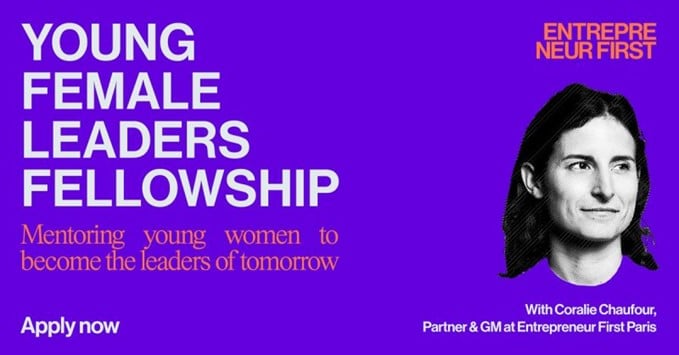Interviewed by Elisa de Aragao Bibay & Alice Borgida
In partnership with HEC Paris, UCL Women's Network have had the privilege of conducting insightful interviews with three women leaders, CEOs, lawyers, and human rights specialists, who have generously shared their career journeys and insights with us.

Coralie Chaufour - Partner, General Manager & Founder - Entrepreneur First Paris
Can you tell us the story about what led you to choose and stay in your particular career path?
After completing my studies at Sciences Po, Wharton and Harvard and being admitted to the New York Bar at the age of 23, I started my career as a corporate lawyer at Cravath, Swaine & Moore, one of the most prestigious law firms in the world. Three years later, I quit law to start my own company, and learnt all the mistakes which are typical of a first-time founder. After shutting down my company, I joined McKinsey in Paris, where I was a consultant and manager for 3 years.
In 2018, I met Alice Bentinck and Matt Clifford, who cofounded Entrepreneur First (‘EF’) in London. Their mission (EF invests in exceptional individuals to help them build startups from scratch) resonated with my own experience and, soon after, I launched EF’s Paris office. Since then, I have supported over 500 founders in Paris and helped create companies that are now collectively worth $1 billion.
My own setbacks as a founder have instilled in me a commitment to supporting and inspiring young and ambitious individuals (including some truly exceptional young women) to achieve the outcomes they deserve.

Can you help describe some of the key challenges you’ve had to overcome while working in a male-dominated industry?
Throughout my career, I’ve been successful in highly competitive jobs within traditionally male-dominated sectors, such as law, strategy consulting and tech entrepreneurship and investment. I’ve also witnessed first-hand the knock-on impact of the limited number of female role models and noticed how many women internalize societal constraints which significantly limit their ambition.
In my view, mitigating these self-imposed barriers is crucial for fostering greater gender diversity in leadership roles. Young women need to feel empowered to build their self-confidence and assertiveness in order to take control of their careers and create exciting opportunities for themselves.
What personal or professional experiences have shaped you as a leader and how did they influence your leadership style?
Rather than relying on traditional mentorship, I've mostly drawn inspiration and learned from working alongside exceptional peers and direct reports, whether men or women.
Early in my career, I worked in demanding professional services environments (eg, Cravath, McKinsey). The intense pressure and high standards cultivated my resilience and sharpened my ability to prioritize effectively.
Later, at EF, I faced the challenge of establishing a new office and assembling a team with limited resources. I’ve strived to lead by example and foster a culture anchored in excellence, accountability, transparency, and a growth mindset. I’m also a firm believer in strengths-based leadership, and I’m continuously evaluating the strengths and weaknesses of each team member in order to empower them to take ownership and maximize their potential.

Looking back on your career, which experiences were unique to being a female leader?
I don’t think any of my past experiences have inherently been unique to being a female leader. However, transitioning through various jobs and career types - from law to entrepreneurship to consulting and finally to tech investment has presented its own set of challenges. I’ve often found myself having to push myself and go the extra mile to prove my capabilities and earn respect and trust from both peers and senior colleagues.

I'd love to encourage young women to think bigger, be less risk averse and strive to be the most ambitious version of themselves.
What are the top 3 tips about career and leadership you could share with the next generation of women?
I believe we need to do more to encourage young women to study and pursue careers in STEM related subjects. In most countries, men still significantly outnumber women in STEM fields. Today’s global challenges demand innovative solutions rooted in engineering and technology, and we need to improve the representation of women in leadership roles within these fields.
I’d love to encourage young women to think bigger, be less risk averse and strive to be the most ambitious version of themselves. What the most talented young women choose to do with their lives will have a profound impact on society. With technology serving as a powerful enabler, today's ambitious young individuals have the opportunity to have an impact on a global scale. It is essential for young women to assert their presence to lead impactful and ambitious projects, such as creating their own startups.
I think this piece of advice from Sheryl Sandberg is still very relevant: the most important career choice you might make is who you choose as a partner. Balancing the demands of a high-pressure job with personal and family commitments can be particularly challenging for women. But having a supportive partner can play a significant part in your ability to succeed.